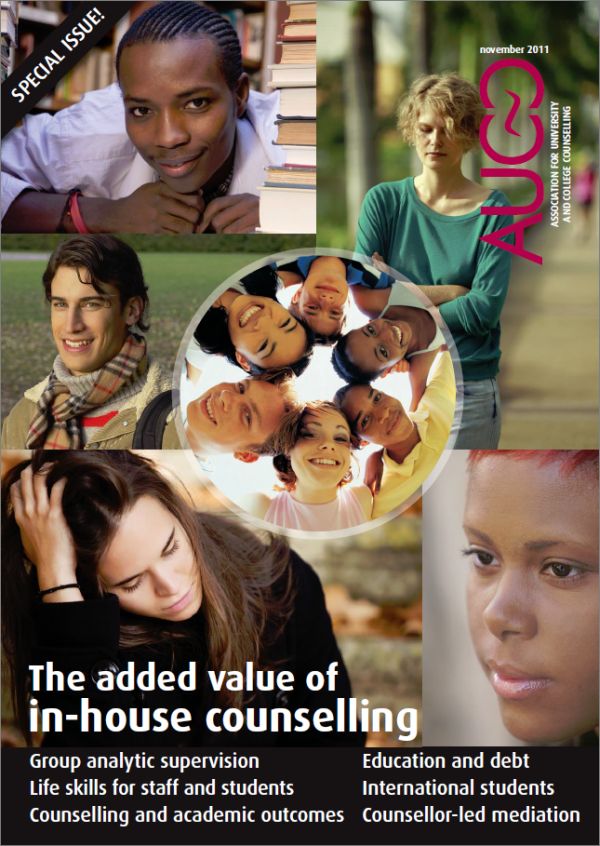In this issue
In support of counselling services: higher education (free article)
At a time of increasing financial constraint and restructuring initiatives, Ruth Caleb talks to Professor Sir Bob Burgess, Vice Chancellor of Leicester University
In support of counselling services: further education
Peter Sampson manages the delivery of welfare, pastoral and learning support services to students at Cornwall College. Dawn Hastings interviews him
Education and debt
How can counsellors respond positively? Les McMinn shares some ideas
Counselling and academic outcomes
Patti Wallace reports on the first stage of data collection and analysis
The Teesside University counselling model
Steve Scott-Marshall shares his experience of embedding the counselling service into the university, with benefits for all
Cardiff University staff counselling service
Tina Abbott puts the case for an internal staff counselling service
Why it makes sense not to outsource your resources
It is essential to think about the likely state of mind of students seeking psychological help, says Robert Harris
Group analytic supervision in HE
Margaret Smith outlines research into the effectiveness of group supervision and reflective practice groups using a group analytic model
International students
Alison Barty describes a new kind of intervention aimed at international students
Tools4Life
A new programme, devised and co-facilitated by Martyn Lloyd and Irene Stone, aims to provide tools for life to both students and staff
Mediation
Richard Worsley explores the role of counsellor-led mediation as a way of resolving disputes and adding value to the institution
Notes from the chair
Update and thoughts from Chris Holt

A pdf of this issue is available from the University and College Counselling archive.
From the editor
Welcome to this special edition of the AUCC journal on the theme of the added value of in-house counselling. To this end we have an interview with Professor Sir Robert Burgess, Vice Chancellor of the University of Leicester and a Vice President of BACP. Until recently the Chair of the Universities and Colleges Admissions Service (UCAS), he leads the steering group that developed the new Higher Education Achievement Report (HEAR) which aims to replace the current degree classification system. He was knighted for services to local and national higher education in the 2010 New Year’s Honours List.
From FE, we have an interview with Peter Sampson, corporate head of learner and student services at Cornwall College, an institution which is growing its counselling service and its commitment to counselling, at a time when a number of colleges and universities are either cutting back or ‘restructuring’. This last seems to consist of some counselling services losing their identity and becoming part of wellbeing, in some cases affecting job descriptions, job titles and even pay scales. We go on to hear from heads of services, group analysts and counsellors – offering what we hope you will agree is a good mix.
Coincidentally, the Royal College of Psychiatrists (RCP) recently published an update on its 2003 seminal report on the mental health of students. It recognises the greater sociocultural diversity of the current generation of students, who have a greater risk of anxiety and depression than previous ones, the result of widening participation and a higher proportion of international students (a particularly vulnerable group), and more fractured family backgrounds alongside rising debt, uncertain job prospects and attempts to live up to expectations of these years as happy, carefree and sociable. The report states that ‘the university or college is seen not only as a place of education but also as a resource for promoting health and wellbeing in students, staff and the wider community’.
It goes on to say that the ‘setting itself is crucially important in determining health and wellbeing’ and recognises that students may lose out on getting the help they need when referred to NHS services with long-term implications both for themselves and society as a whole. They urge closer collaboration between NHS and HE providers and cite Leeds, Bath, East London, Cambridge and Anglia Ruskin universities as models of collaborative working. The report highlights the potential fragility of international students – and we hear this issue from Alison Barty and Sachiko Kishi on a student-centred support group project for newly arrived international students.
The report also emphasises the need for long-term prospective research – and lead advisor, Patti Wallace, describes AUCC’s current and future research plans in this issue of AUCC. The RCP report concludes by explicitly recommending that the provision of student support in HE (and by inference FE) should include counselling services, services for international students and those with a disability, all of which ‘greatly enhance the student experience’ and specifies that these should ‘be maintained and when possible expanded’. Dr John Callender, Chair of the working group, said: ‘demand ... continues to rise. Although there are some excellent support services for students across the country, in many universities the provision of services has not kept pace with expanding student numbers – leaving existing services overstretched.’ AUCC member Eileen Smith, Head of Counselling at the University of Hertfordshire and a joint author of the report, has been quoted as agreeing that many students may be the first in their family to reach this level of education and so may face ‘...a lot of pressure...to succeed. They can be carrying the hopes of a whole family.’
Last not but least, your journal will shortly be undergoing a redesign – if you have any particular ideas, please do contact me; as ever I urge you to send in your thoughts, ideas, and any new projects that you are involved in and share them with the membership.
Dani Singer
Editor
